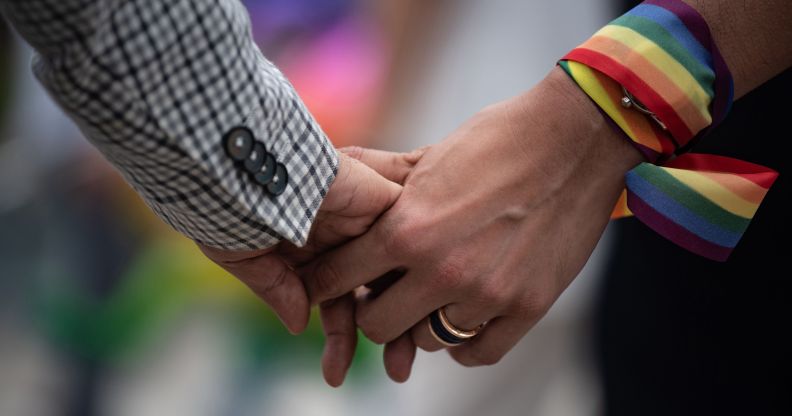China just ruled out allowing same-sex marriage

A same-sex couple hold hands during an LGBT+ rights event in Hong Kong. (Philip Fong/Getty)
China has confirmed that marriage equality is not on the cards for its 1.4 billion-strong population.
Since neighbouring Taiwan became the first country in Asia to legalise same-sex marriage, China has faced continuing pressure to extend marriage rights to LGBT+ people.
But on Wednesday, August 21, a parliamentary spokesperson confirmed that the Chineese parliament will not be following suit.
Zang Tiewei, spokesman for parliament’s legal affairs commission, told reporters that Chinese law describes marriage as between a man and a woman.
“This rule suits our country’s national condition and historical and cultural traditions,” Tiewei said, according to Reuters.
This rule suits our country’s cultural traditions.
“As far as I know, the vast majority of countries in the world do not recognise the legalisation of same-sex marriage.”
Equal marriages are recognised in 27 countries, according to the Council on Foreign Relations, but remain banned throughout most of Asia, Africa and Eastern Europe.
LGBT+ rights in China are stunted.
Same-sex relationships have been legal in China since 1997, although homosexuality remained on an official list of mental disorders until 2001.
Since then, the Chinese government has stalled on any further advancements to LGBT+ rights, and is said to have a policy of “not encouraging, not discouraging and not promoting.”
According to Outright International, “discrimination against LGBT people continues to be written into many different areas of law in China”.
LGBT+ couples are not recognised as families, and there is specific law against male rape.
Trans people are still considered to have a mental illness and must win the consent of their families before they can medically transition.
According to Amnesty International, this leads some young trans people to take drastic and unsafe action, taking backstreet hormones or even attempting surgery on themselves.
“China is failing transgender people,” said Doriane Lau, China researcher at Amnesty.
“Discriminatory laws and policies have left many people feeling they have no choice but to risk their lives by performing extremely dangerous surgery on themselves and seeking unsafe hormone drugs on the black market.”

